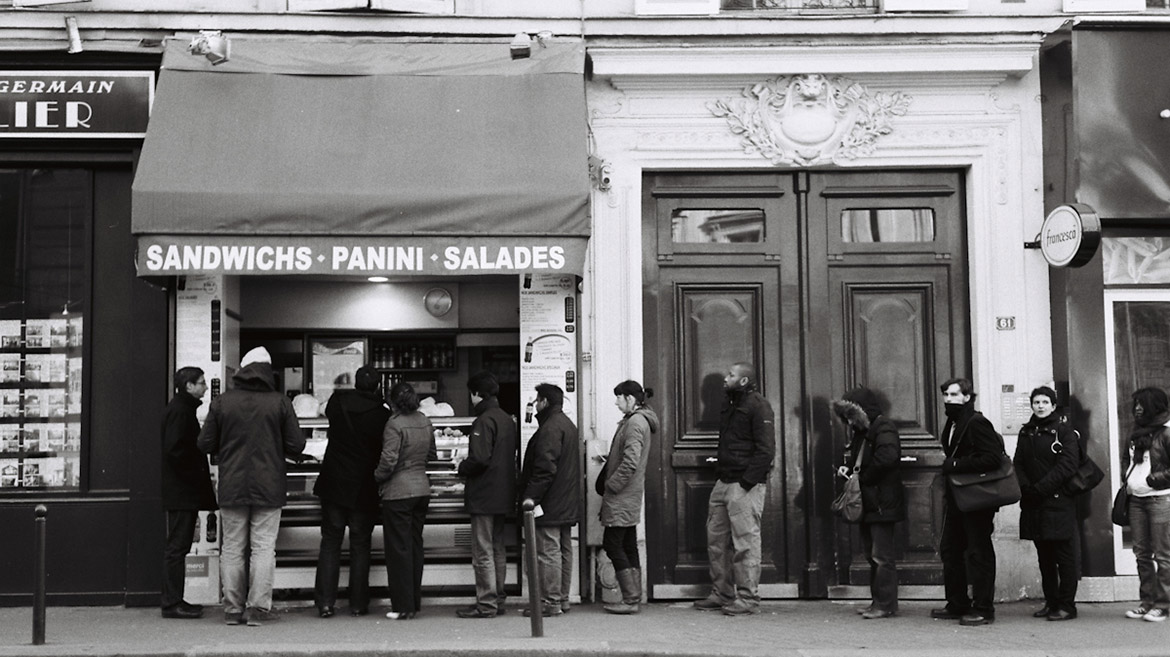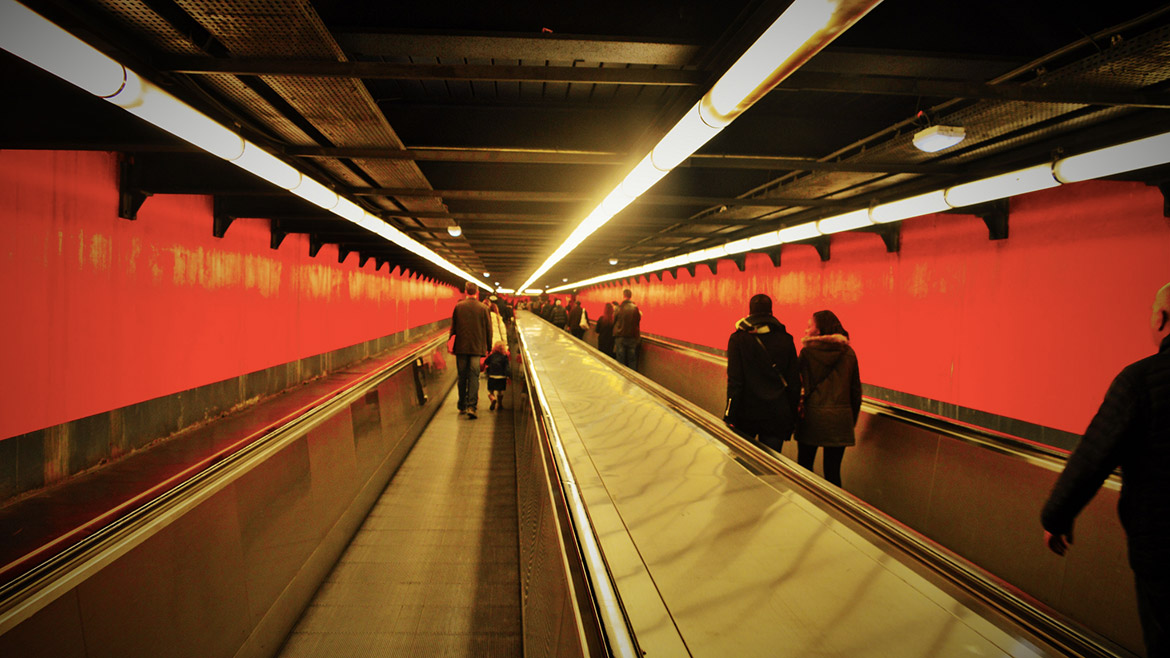
Working in Paris is better than London and here’s why
There’s a lot of talk these days about Paris trying to tempt companies away from London, which always makes me imagine Paris sticking a stockinged leg in front of a car full of cartoon wolves, who screech obligingly to a halt. Whether Brexit will make this a reality, we don’t yet know. But, having worked in both cities (London for 10 years and Paris for 7 and counting) I know that there are certain advantages to working in Paris. Let’s a have look at some of them.
1. Your bosses pay for half of your lunch
This is a fun one. The law in France requires employers to contribute towards the cost of staff meals taken while they are working (typically lunch). Back in the 60s, companies needed to provide a restaurant if they had over 25 employees, but the powers that be realised what a massive pain in the cushiony parts this was, so they invented lunch vouchers as an alternative way for bosses to fulfil their obligations.
Titres-restaurant vouchers are given to worker to pay for lunch in restaurants, cafés and takeaway food places. Half of the value of the voucher is taken from the employee’s salary, the other half is covered by the employer. For example, I get a Chèque Déjeuner voucher worth €8 for every day I work but only pay €4 for it. Over a year that’s €920 of free sandwiches.
FREE SANDWICHES.
You can also use lunch vouchers in supermarkets and even markets, so some frugal people who are capable of planning ahead bring lunch in from home and use the vouchers to pay for grocery shopping. Just you can’t buy alcohol with them, as someone close to me discovered while trying to buy a bottle of wine recently. “No, madame,” she said to me my friend pityingly.

I’ll have what they’re having
2. So much cheaper to get to work
The price of a monthly London travelcard (zones 1 – 5) is €250. This gives you unlimited access to train, tube, bus and tram services across a huge network in one of the world’s biggest cities. That’s a pretty good deal, right?
Um, except that the Parisian equivalent – same zones, same transport methods, same size of network and similar city size – costs €73. Yes, that’s for a month.
It gets even better – and if you’re a Londoner, you might want to look away now – your company pays for half of your travel cost. Yup. So out of that €73, you end up paying €36.50 a month. Over a year, a Parisian pays €2562 less than a Londoner.
How can it be so cheap? ask Londoners, weeping blood right now. Basically, because the government owns RATP who runs the service, and so subsidises the cost of train tickets. You might well say that we do pay for the tickets, through our taxes, and that’s a fair point. One to mull over while brushing free sandwich crumbs off my jumper. Perhaps this cheapness has an impact on the quality of services, mutters my imaginary Londoner. Well, no, France’s rail network was recently ranked third best in Europe, ahead of Britain.

The automated walkways at Auber, or the ending sequence of ‘2001: A Space Odyssey’? You decide.
3. You can’t work more than 35 hours in one week
The law that socks it to The Man, or a licence to be lazy? Whichever your view, the French law limiting hours spent grafting is a fact of life for many French workers. I say ‘many’ and not ‘all’ workers because not everyone is covered by this law, for example, managers – they have to slave away as long as their bosses fancy. But your average Joséphine gets to clock off after 7 hours a day. Any overtime worked would have to be paid for in extra spondulicks or, more usually, time off in lieu.
Do Londoners work longer? According to the Office for National Statistics, yes. A bit anyway. 37.1 hours on average per week in 2015, to be precise. That’s two hours a week that British people could be spending eating Gregg’s pasties and having picnics in rainy carparks, or whatever it is that British people do in their free time.
4. You are allowed to ignore work emails and calls when you’re at home
My last job in London involved a work Blackberry that would flash a green light whenever I had a new email. Its demands for attention when I was at home was as unwelcome an intrusion as another kind of flasher. No one forced me to check the latest blah-blah in a chain of 30 but knowing someone had sent something niggled away at my tranquillity like a dripping tap. The recent Loi de Travail made it illegal to oblige employees to check work email or receive calls outwith work hours. Meaning, in theory at least, that French people are able to forget all about work while they’re not there and get on with the important business of perfecting their croissant recipes and learning to play the accordion, or whatever it is that French people do in their free time.

Céline wished Jean-Luc would get off the phone so she could go eat her free sandwiches in peace.
5. Health insurance is mandatory
I’m a big fan of Britain’s national health service, where ‘free’* medicine is available to everyone. In fact, I still find it awkward in France when I have to pay the doctor at the end of a consultation; to me it just seems inappropriate, like paying a priest or a lover.
France also has a health service that is free* to the most needy or which you pay for partially according to your means. However most people – those who are able – have health insurance. This gives them to access better quality services, or just plain allows them to pay for services that would otherwise land them with a hefty bill. Access to health insurance got a lot easier in January 2016 when employers were obliged to offer a health insurance package to their employees. Participation is up to the employee but should they accept, they only pay half, the rest is covered by the employer.
Personally, I’m not a fan of two-tier health systems but this is what we have in France, and at the very least, more people have access now to a higher quality care. So, debatable whether this really is an advantage over Britain’s NHS, but I include it because automatic access to private health care isn’t something offered to all in Britain.
*Obvs it’s not really free, it’s paid for in taxes.
That’s my list then. Have you worked in either or both of these cities? Do you prefer one over the other and why? Do you think the obligations employers have towards their staff has the effect of slowing down the economy and/or increasing unemployment? Do tell in the comment. And please share if you’ve enjoyed! 🙂
[divider] [/divider]





